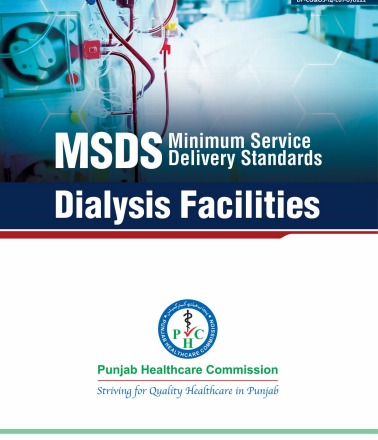LAHORE – The Caretaker Provincial Cabinet has approved the minimum service delivery standards (MSDS), as developed by the Punjab Healthcare Commission, for the dialysis centres.
In this regard, the Specialised Healthcare and Medical Education Department has issued a notification. These Standards of the PHC, developed after thorough consultations with the experts, professional associations, and stakeholders, will be implemented in all the dialysis centres across the province. These MSDS comprise 37 basic standards and compliance requirements covering 10 functional areas, including care of patients, management of medication, continuous quality improvement, information management systems, and infection prevention and control. The MSDS also describes the survey process and scoring methodology with each indicator to facilitate implementation and assessment of compliance.
As per the Standards, besides hospital facilities, the standalone centres must have easy access to emergency departments, ICUs, pharmacies, blood banks and diagnostic services. It is binding on the administrations to appoint only qualified and experienced professionals, who are conversant with and implement the relevant laws and regulations. Their qualifications, job descriptions and experience details have been enlisted in the MSDS. Moreover, every staff member must be screened and managed against infections.
Also, these centres must have the requisite infrastructure ensuring sufficient space for the enlisted services. As far as the haemodialysis and other machines and equipment, dialysis fluid and substitution solutions are concerned, these must conform to the approved specifications. These centres should maintain accurate medical records of patients, and each patient is monitored for intra-dialysis complications. HIV, hepatitis B and C prevention and isolation SOPs are to be practised, which have been made part of the MDSD. Also, reusable items are disinfected and sterilised in accordance with the SOPs before reuse.
Chief Executive Officer PHC Dr Muhammad Saqib Aziz has said the MSDS have been finalised keeping view the ground realities so that the centres, providing services to the marginalised communities and having small-scale practice, are also able to implement the same.
“The MSDS is a dynamic document, and emerging developments in the field will be incorporated as and when required,” he said. He mentioned that administrations of the facilities must implement other relevant laws, rules, regulations and SOPs pertaining to health services and their applicability to the centres, including but not limited to handling of contaminated waste, infectious hospital waste (Hospital Waste Management Rules, and Prevention and Control of Hepatitis), clean water supply, sanitation, ventilation, safe food, procurement of safe equipment, and others.










